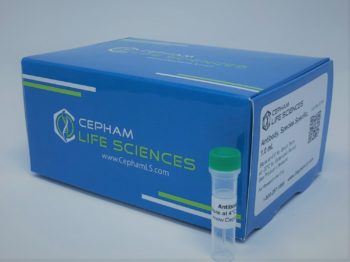Description
Aliases
CAMK2A; KCC2A; kinase CaMK2-alpha; CaMKII-alpha;
Antibody Type
Polyclonal Antibody
Uniprot ID
Swiss-Prot#: Q9UQM7; Immunogen Peptide sequence around phosphorylation site of threonine 305 (I-L-T(p)-T-M) derived from Human CaMK2α/β/δ. Raised In Rabbit Species Reactivity Human Mouse Rat Tested Applications WB IHC Recommended dilution: Western blotting: 1:500~1:1000, Immunohistochemistry: 1:50~1:100 Background / Function Calcium/calmodulin-dependent protein kinase that functions autonomously after Ca2+/calmodulin-binding and autophosphorylation, and is involved in dendritic spine and synapse formation, neuronal plasticity and regulation of sarcoplasmic reticulum Ca2+ transport in skeletal muscle. In neurons, plays an essential structural role in the reorganization of the actin cytoskeleton during plasticity by binding and bundling actin filaments in a kinase-independent manner. This structural function is required for correct targeting of CaMK2A, which acts downstream of NMDAR to promote dendritic spine and synapse formation and maintain synaptic plasticity which enables long-term potentiation (LTP) and hippocampus-dependent learning. In developing hippocampal neurons, promotes arborization of the dendritic tree and in mature neurons, promotes dendritic remodeling. Participates in the modulation of skeletal muscle function in response to exercise. In slow-twitch muscles, is involved in regulation of sarcoplasmic reticulum (SR) Ca2+ transport and in fast-twitch muscle participates in the control of Ca2+ release from the SR through phosphorylation of triadin, a ryanodine receptor-coupling factor, and phospholamban (PLN/PLB), an endogenous inhibitor of SERCA2A/ATP2A2. Carl W. Tong, J. Physiol., Aug 2004; 558: 927 – 941. Pierre R, J. Biol. Chem., Sep 1997; 272: 24133.Daliang Wang, PNAS, Jun 1998; 95: 7133. Conjugate Unconjugated Storage Buffer Rabbit IgG in phosphate buffered saline (without Mg2+ and Ca2+), pH 7.4, 150mM NaCl, 0.02% sodium azide and 50% glycerol. Form liquid Storage Shipped at 4°C. Upon delivery aliquot and store at -20°C or -80°C. Avoid repeated freeze. Purity Antibodies were produced by immunizing rabbits with synthetic phosphopeptide and KLH conjugates. Antibodies were purified by affinity-chromatography using epitope-specific phosphopeptide. Non-phospho specific antibodies were removed by chromatogramphy using non-phosphopeptide. Modification Phospho-Thr305 100?l
NCBI Gene#: 816/817; Additional information
Size


